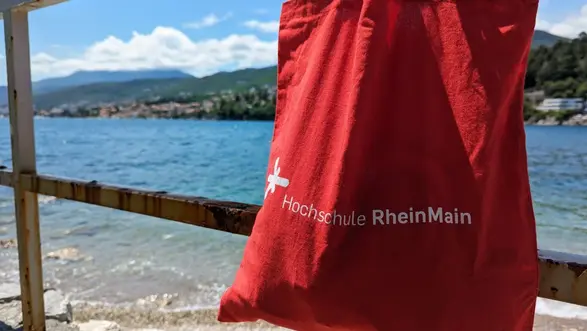Funding for studying
ERASMUS+ funding rates for studying abroad
as of winter semester 2024/25
| Destination country | Monthly funding rate | |
|---|---|---|
| Group 1 (higher living costs) | Belgium, Denmark, Finland, France, Ireland, Iceland, Italy, Liechtenstein, Luxembourg, Netherlands, Norway, Austria, Sweden (Great Britain) | €600 |
| Group 2 (medium living costs) | Estonia, Greece, Latvia, Malta, Portugal, Slovakia, Slovenia, Spain, Czech Republic, Cyprus | €540 |
| Group 3 (lower living costs) | Bulgaria, Croatia, Lithuania, North Macedonia, Poland, Romania, Serbia, Turkey, Hungary | €540 |
The funding period is limited to a maximum of four months. Stays of less than four months are billed on a daily basis. The dates on the certificate of residence from the partner university apply. The final scholarship amount is determined when you send us your confirmation of stay at the end. The scholarship amount may be corrected when the second installment is paid.
In addition to ERASMUS+ funding, you can also apply for Auslands-BAföG. The amount of the ERASMUS scholarship that exceeds €300/month will be counted as income.

Special funding
Equal opportunities is a key goal of the Erasmus+ program. To increase the number of participants with fewer opportunities, the National Agency for Erasmus+ Higher Education Cooperation within the DAAD (NA DAAD) has increased the funding rates, expanded the target groups eligible for additional financial support (top-ups), and simplified access conditions . The target groups eligible for top-ups, which are paid in addtion to the base amounts, are listed in the next sections.
There is no legal entitlement to a specific funding rate or funding period.
Top-ups
Equal opportunities is a key goal in the Erasmus+ program. To promote equal opportunities, ERASMUS+ offers additional financial support (top-ups) to people with fewer opportunities , including students with disabilities, chronic illnesses or working students. The National Agency for Erasmus+ Higher Education Cooperation within the DAAD (NA DAAD) has also simplified access conditions and has increased its funding rates. The target groups eligible for top-up amounts that are paid in addition to the base amounts are listed in the next sections.
There is no legal entitlement to a specific funding amount or funding period.
If you are a first-generation university student, you can obtain a top-up of 250 euros per month (for the respective funding period) provided the following criteria apply to you:
Both your parents do not have a degree from a university, university of applied sciences, higher education institution or vocational academy that is comparable to a university degree. Degree programs completed abroad count as university degrees, even if they are not recognized in Germany.
The special funding can only be awarded once, even if several criteria apply.
You can receive a top-up for employed students of 250 euros per month (for the respective funding period) provided the following criteria apply to you:
- You have been continuously employed for at least six months within one year prior to the start of the semester abroad
- The monthly net salary was above EUR 450 and below EUR 850 (all activities added together)
- The employment is not continued during the stay abroad
- The employment was not a self-employment
The special funding can only be awarded once, even if several criteria apply.
You can receive a top-up for a disability of 250 euros per month (for the respective funding period) provided the following criteria apply to you:
- If you have a GdB (Grad der Behinderung, German severity scale of disability) of 20 or more (proof provided by a copy of your disability pass).
You can also submit a real costs request of up to €15,000.
The special funding can only be awarded once, even if several criteria apply.
You can receive a top-up for a chronic illness of 250 euros per month (for the respective funding period) provided the following criteria apply to you:
- You have a chronic illness that causes additional financial expenses abroad (proof by medical certificate, the type of illness does not have to be mentioned).
You can also submit a real costs requests of up to €15,000.
Special funding can only be granted once, even if several criteria apply.
You can receive a top-up for taking your child or children abroad of 250 euros per month (for the respective funding period) provided the following criteria apply to you:
- you are taking your child or children abroad with you (copy of the child's birth certificate and a school or daycare registration certificate for the child). Please contact erasmus@hs-rm.de
You can also submit a real costs request of up to €15,000.
Special funding can only be granted once, even if several criteria apply. The funding can only be granted once, regardless of the number of children accompanying you.
If you have a disability or chronic illness or would like to take your child or children abroad, you can submit a real costs request of up to EUR 15,000 for the additional costs you will have as a result of your stay abroad.
The request must be submitted in good time two months before the start of your stay. A detailed cost estimate must be submitted. Costs for accompanying persons or for a preparatory trip can also be claimed. If you are interested, please contact us as soon as possible: erasmus@hs-rm.de
Travel allowance from the winter semester 2025/26
From the 2025 funding project (at HSRM from WS 25/26), you will receive a one-off travel allowance depending on the distance to your partner university. The grant is based on the one-way distance as the crow flies according to the EU Distance Calculator and is determined by the EU. It is independent of your actual travel expenses.
If you travel by sustainable means of transport (=train, bus, carpool), the travel allowance is slightly higher ("Green Travel"). The table below applies until further notice.
| One-way distance (as the crow flies) | Standard travel | Green Travel |
| 10-99 km | 28 € | 56 € |
| 100-499 km | 211 € | 285 € |
| 500-1999 km | 309 € | 417 € |
| 2000-2999 km | 395 € | 535 € |

Sustainability and environmental protection
Logically, gaining experience abroad means living and traveling abroad for a longer period of time. After all, the best way to really immerse yourself in a culture is to spend time there and explore the environment. On the other hand, too much travel is bad for the climate.
Living in a climate-friendly way is one of the great challenges of our time. But you can also make sustainable decisions for your semester abroad. We would like to encourage you to look into environmentally friendly travel options, such as bus and train.
ERASMUS+ rewards you with a higher travel allowance for so-called green travel, i.e. if you travel the majority of the journey to or from your partner university by bus or train and do not travel by plane or car. If this makes one or more overnight stays necessary and you are therefore traveling longer, we will even extend your scholarship accordingly by up to six days (proof required; over 8 hours per direction of travel. = one additional day, over 16 hours = two days, over 24 hours = 3 days)).
You can contribute to environmental protection not only through your choice of transportation, but also through your behavior on site. You can find suggestions, for example, in the reports of other students at: https: //www.studieren-weltweit.de/inspirieren-lassen/hashtag/nachhaltigkeit/
